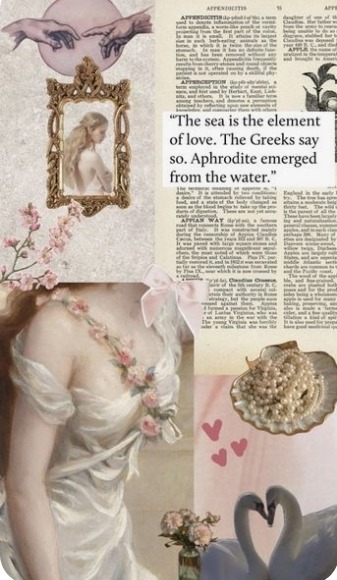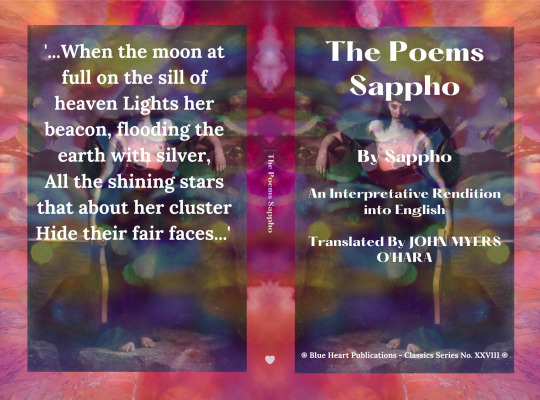#Ancient Greek poetry
Text
Come, shining lyre, speak to me--gain the power of utterance.
ἄγι δὴ χέλυ δῖα μοι λέγε
φωνάεσσα δὲ γίνεω.
--Sappho, fr. 118
#quote#quotes#classics#tagamemnon#Sappho#Greek#Greek language#Ancient Greek#Ancient Greek language#Greek translation#Ancient Greek translation#poetry#poetry in translation#Greek poetry#Ancient Greek poetry#fragment
538 notes
·
View notes
Text
Sometimes at sunset the rosyfingered moon surpasses all the stars. And her light stretches over salt sea equally and flowerdeep fields. And the beautiful dew is poured out and roses bloom and frail chervil and flowering sweetclover.
Sappho, from If not, winter: fragments of Sappho (trans. by Anne Carson)
#sappho#anne carson#if not winter#fragments of sappho#fragments#ancient greek poetry#moon#stars#rosy fingered moon#sometimes at sunset the rosyfingered moon surpasses all the stars#if not winter: fragments of sappho#Σαπφώ#Ψάπφω#rosy-fingered moon
444 notes
·
View notes
Text

Erastus Dow Palmer (1817-1904)
"Sappho" (c.1858)
#sculptures#art#artwork#female portrait#sappho#erastus dow palmer#plaster#fine art#american artist#portrait of a woman#ancient greek poetry#poet#drapery#side profile#1850s#mid 1800s#mid 19th century#aesthetic#aesthetics#ancient greece
503 notes
·
View notes
Text

♡New wallpaper♡
#coquette#dollette#pink aesthetic#pinterest#princess#dior beauty#skincare#self care#skincare tips#pink#rennaissance#renaissance art#aphrodite#ancient greece#ancient world#ancient greek art#ancient greek aesthetic#ancient greek poetry
148 notes
·
View notes
Text

The First Cologne Epode by Archilochus (tr. Peter Bing and Rip Cohen), from Games of Venus: An Anthology of Greek and Roman Erotic Verse from Sappho to Ovid
#the first cologne epode#archilochus#quote#typography#aesthetic#dark academia#light academia#games of venus#peter bing#rip cohen#poetry#ancient greece#ancient greek literature#ancient greek poetry#history
26 notes
·
View notes
Text
But I love extravagance,
And wanting it has handed down
The glitter and glamour of the sun
As my inheritance.
Sappho, But I love extravagance
#Sappho#But I love extravagance#extravagance#maximalism#glitter#glamour#sun#sun quotes#Ancient Greek literature#Ancient Greek poetry#poetry#poetry quotes#quotes#quotes blog#literary quotes#literature quotes#literature#book quotes#books#words#text
23 notes
·
View notes
Photo

10: Winter Cosiness
Zeus is raining down a great winter storm
From the sky, and the rivers have frozen.
But defy the storm! Put up a fire,
Mix unsparingly the honeysweet wine,
And throw a soft pillow to the side of your head.
Alkaios, Fragment 338, translated by William S. Annis
Ariadne and Dionysos having some winter cosiness.
394 notes
·
View notes
Text

“May I write words more naked than flesh,
stronger than bone, more resilient than
sinew, sensitive than nerve.”
I’ve been totally in love with Sappho and her works recently, so inspiration struck! I used this vase painting of her

(it was painted over 100 years postmortem, but it’s the earliest confirmed image of her that has survived)
#ancient greek literature#ancient greece#ancient greek language#Sappho#sappho of lesbos#digital art#original content wow#poetry#ancient greek poetry#procreate#digital portrait
64 notes
·
View notes
Text

(source - sunday bloo)
#poets on tumblr#poet#poetry#original poem#dark academia#ancient greek poetry#divine goddess#divine feminine#goddess aesthetic#dark academia quotes#dark academia aesthetic#light academia#light academia aesthetic#divine#divine aesthetic#persephone#aphrodite#artemis#mystical#ethereal#celestial
323 notes
·
View notes
Text
An Epigram on Marcus Aurelius' Meditations
Anthologia Palatina XV.23, author unknown
If you wish to master grief,
Open up this blessed book
And come to it attentively--
Through it, you may easily see
The richest way of thinking about
What's to come, what is now,
And what is past--how joy and pain
Are no whit mightier than smoke.
εἰ λύπης κρατέειν ἐθέλεις,
τήνδε μάκαιραν ἀναπτύσσων
βίβλον ἐπέρχεο ἐνδυκέως,
ἧς ὕπο γνώμην ὀλβίστην
ῥεῖά κεν ὄψεαι ἐσσομένων,
ὄντων ἠδὲ παροιχομένων,
τερπωλὴν τ᾽ ἀνίην τε
καπνοῦ μηδὲν ἀρειοτέρην.
#classics#tagamemnon#Greek#Greek language#Greek translation#Ancient Greek#Ancient Greek language#Ancient Greek translation#poem#poetry#Greek poetry#Ancient Greek poetry#poetry in translation#epigram#Marcus Aurelius#Meditations#Anthologia Palatina#Palatine Anthology#Anthologia Graeca#Greek Anthology
72 notes
·
View notes
Text
"Whispers from Antiquity: An Intimate Journey with 'The Poems of Sappho' by John Myers O'Hara"

John Myers O'Hara's translation of 'The Poems of Sappho' is a delicate and captivating rendition that brings the ethereal verses of the ancient Greek poet into the hands of contemporary readers. This interpretative journey into Sappho's lyrical world is a testament to O'Hara's mastery of language and his commitment to preserving the essence of Sappho's poetic genius. As one delves into the pages of this collection, the poet's voice echoes through the ages, transcending time and cultural barriers.
The title itself, 'The Poems of Sappho: An Interpretative Rendition into English,' hints at O'Hara's approach to translating the works of this enigmatic poet. Rather than a literal translation, O'Hara offers an interpretation that seeks to capture the emotional depth, sensuality, and nuances of Sappho's verses. The result is a collection that resonates with the modern reader while maintaining the spirit of Sappho's ancient lyricism.
Sappho, known for her evocative poetry centered around themes of love, desire, and the complexities of human emotion, finds a sympathetic interpreter in O'Hara. The translator skillfully navigates the challenges of capturing the subtle nuances and cultural contexts of Sappho's work, presenting readers with a collection that feels both authentic and accessible. The emotional intensity and intimacy of Sappho's poetry are preserved, allowing contemporary audiences to connect with the poet's timeless expressions of love and longing.
O'Hara's introduction provides valuable insights into Sappho's life, historical context, and the challenges inherent in translating her work. This contextualization enhances the reader's appreciation for the significance of Sappho as a pioneering voice in ancient Greek literature and elevates the collection beyond a mere compilation of verses. O'Hara's dedication to presenting Sappho in a holistic manner, beyond the stereotypical depiction of her as a love poet, adds depth to the reader's understanding of this influential figure.
The poet's exploration of themes such as the fleeting nature of beauty, the ecstasy of love, and the yearning for connection is as relevant today as it was in ancient times. O'Hara's translation not only preserves the historical and cultural richness of Sappho's work but also invites readers to contemplate the universal aspects of the human experience that transcend temporal and linguistic boundaries.
In conclusion, 'The Poems of Sappho: An Interpretative Rendition into English' by John Myers O'Hara is a mesmerizing exploration of one of antiquity's most celebrated poets. O'Hara's careful balancing act between fidelity to the original and a contemporary sensibility results in a collection that feels fresh, emotionally resonant, and true to the spirit of Sappho's lyrical artistry. This interpretative rendition serves as a bridge between ancient wisdom and modern sensibilities, inviting readers to savor the poetic whispers that have endured across centuries.
John Myers O'Hara's translation of 'The Poems of Sappho' is available in Amazon in paperback 10.99$ and hardcover 18.99$ editions.
Number of pages: 125
Language: English
Rating: 9/10
Link of the book!
Review By: King's Cat
#Sappho#John Myers O'Hara#Ancient Greek poetry#Lyrical interpretation#Love poetry#Sensuality#Emotional depth#Ancient literature#Greek lyricism#Interpretative rendition#Contemporary resonance#Human emotion#Poetic genius#Cultural context#Historical insights#Intimate verses#Desires and longing#Emotional intensity#Universal themes#Love and beauty#Timeless expressions#O'Hara's translation#Antiquity's voice#Cultural significance#Ancient wisdom#Contextualization#Poetic exploration#Influential figures#Evocative language#Fidelity to the original
8 notes
·
View notes
Text
“In conclusion, I hope to have demonstrated that Herodotus establishes in his prologue a relationship of considerable complexity with his poetic predecessors and contemporaries. From the outset he presents his monumental historical narrative of the Greco-Persian wars as simultaneously indebted and opposed to a network of poets, whose Panhellenic cultural prestige he challenges in the innovative medium of prose. Epic—specifically, Homeric epic—is tacitly acknowledged as a model of primary importance: Herodotus adopts the martial subject matter of the Iliad and projects the persona of the peripatetic Homeric hero Odysseus. In abandoning the deeply retrospective glance of the epic tradition to perpetuate the kleos of
fully human warriors, Herodotus follows the example of various poets and artists who celebrated the great Greek victories over the Persians in the early decades of the fifth century. At the same time, Herodotus implies that his own new medium of prose historiê, committed to writing, will surpass poetry’s ability to perform its traditional function of public commemoration. Herodotus constructs the entire prologue as an ingenious prose priamel, a poetic rhetorical structure that enables him to emphasise important points of contact with and departure from Homeric epic, Sappho’s fr. 16, and the portrayal of Croesus in epinician poetry. Finally, at the transition from prologue to narrative proper (1.5.4), Herodotus summarises his perception of historical change as rooted in the transience of human prosperity, introducing this insight with a distinctive term (ἐπιστάµενος) that signals his appropriation of the cultural authority typically bestowed by his contemporaries upon the poetic sage.87"
From the article of Charles C. Chiasson “Herodotus’ Prologue and the Greek Poetic Tradition”, Histos 6 (2012), 114-143 (conclusion).
Source:
10 notes
·
View notes
Text

The First Cologne Epode by Archilochus (tr. Peter Bing and Rip Cohen), from Games of Venus: An Anthology of Greek and Roman Erotic Verse from Sappho to Ovid
#the first cologne epode#archilochus#quote#typography#aesthetic#dark academia#light academia#games of venus#peter bing#rip cohen#poetry#ancient greece#ancient greek literature#ancient greek poetry#hell
12 notes
·
View notes
Text
Sappho, Fragment 34 Voigt
ἄστερες μὲν ἀμφὶ κάλαν σελάνναν
ἂψ ἀπυκρύπτοισι φάεννον εἶδος
ὄπποτα πλήθοισα μάλιστα λάμπη
γᾶν <ἐπὶ παῖσαν>
****
ἀργυρία
Poetic translation:
The gleaming stars all about the shining moon
Hide their bright faces, when full-orbed and splendid
In the sky she floats, flooding the shadowed earth
with clear silver light.
Literal translation:
The stars about the fair moon lose their bright beauty when she, almost full, shines [on all] earth with silver.
Free of any human interaction, somehow still full of Sappho's typical melanchony, it offers a personified view of the cosmos like embarassed little girls watching in awe as a woung woman shines bright with silver.
Because the stars are clearly the focus, the first word we can see and what I think the reader should relate to; we all pale in comparison to bright, shiny full moon, so gracious to bathe of all us in her light - and the stars are, here, no less human.
For italian speakers, I higly recommend this analysis by the University of Bologna, that goes into finer detail than I ever could.
Certainly my very favorite of all of Sappho's work. I'm already a sucker for nocturnals - Sappho and Leopardi, long loves of mine, feed me well in that regard - and this one takes the cake.
Also one of the firsts of hers I've ever had to translare, which doesn't helo lessen my enjoyment for sure. The beauty in her fragments is also in the unsaid, unseen; was the silver surely the light, or is there in the line we're missing, some other feminine noun to complete it?
It also makes me kind of mad, solely because a lot of poetry sites out there dealing with ancient greek poetry conviniently forget to inform that we don't actually have the whole poem, a lot of it are just guesses (even if based on studies and evidences) and meaning isn't as clear as they make it seem. For example, almost none of the sites i've searched through for a translation mentioned that "on all" the earth isn't in the text, but was assumed through studies and is often marked as such in greek. Or that there's a whole missing line between that and "silver".
Regardless, I hope that this translitteration and translation can be of satisfaction, especially to those much more expert in this subject than little ol me.
↑ the analysis link again, for easier clicking.
#poetry#poem#poems#poets#poetry on tumblr#poesia#poesie#poeti#ancient poetry#sappho#ancient greek poetry#poetry analysis#greek poetry#sappho poetry#this one is super early bc i couln't wait to start lmao#next ones are each going to be on a monday i prommy
17 notes
·
View notes
Text
Here under boughs a bracing spring
Percolates, roses without number
Umber the earth and, rustling,
The leaves drip slumber.
Sappho, Leave Crete and sweep to this blest temple
#Sappho#Stung with Love#Poems and Fragments#spring#spring quotes#spring equinox#vernal equinox#roses#nature#nature quotes#Ancient Greek literature#Ancient Greek poetry#Greek poetry#poetry#poetry quotes#quotes#quotes blog#literary quotes#literature quotes#literature#book quotes
47 notes
·
View notes
Text
ο]ἰ μὲν ἰππήων στρότον, οἰ δὲ πέσδων,
οἰ δὲ νάων φαῖσ᾽ ἐπ[ὶ] γᾶν μέλαι[ν]αν
ἔ]μμεναι κάλλιστον, ἔγω δὲ κῆν᾽
ὄττω τις ἔραται·
[...] τᾶ]ς κε βολλοίμαν ἔρατόν τε βᾶμα
κἀμάρυχμα λάμπρον ἴδην προσώπω
ἢ τὰ Λύδων ἄρματα καὶ πανόπλοις
πεσδομ]άχεντας.
Άλλοι τους καβαλάρηδες, άλλοι τις τάξεις
Των πεζών και άλλοι τα καραβια
Λογαριάζουν για ο,τι ομορφότερο πάνω στη μαύρη γη.
Μα εγώ λέγω πιο όμορφο ο,τι αγαπά ο καθείς
[...] Πώς θα θελα να ξαναδώ το αγαπημένο βήμα της
Και το σπιθιρισμα που λαμπυρίζει στη θωριά της,
Παρά τα άρματα τα λυδικά ή τους πεζους
Που αρματωμένοι πολεμάνε.
Σαπφώ απόσπασμα 16.1-20 (απόσπασμα) Lobel-Page
Μετάφραση Π.Λευκατσα
#sappho#sapphopoet#sapphopoems#sapphothelesbian#sapphic#sapphire#greek poem#lobelpage#lesbian#ancient greek#ancientgreekpoem#ancient greek poetry#love poem#sapphic poem#sapphic poetry#love#sapphic love
3 notes
·
View notes